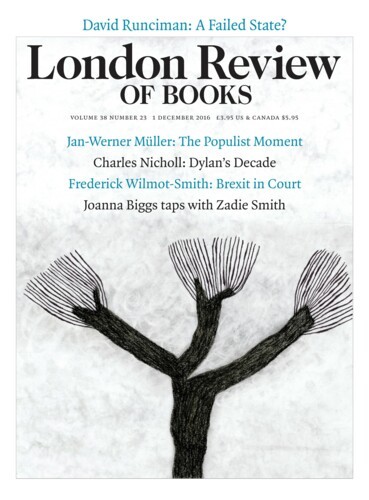‘We are on familiar ground,’ Lord Faulks said. Another increase to court fees, another futile motion of regret in the House of Lords. Fees for an uncontested divorce petition – which costs, on average, £270 to process – went up from £410 to £550. Government profits from divorce are set to increase.
Frederick Wilmot-Smith
Frederick Wilmot-Smith’s first book, Equal Justice, is published by Harvard.
The legal problems arising from the EU referendum need to be distinguished from the political ones. One thing is clear: the referendum itself had no more legal effect – either within the United Kingdom or on the UK’s legal relations with the European Union – than a straw poll of your friends (or mine). The UK is still a member of the EU and has not, legally, indicated its desire to leave the Union. The political consequences are quite another matter, and may well lead to exit from the EU.
The United States Supreme Court does not permit video recording. ‘The day you see a camera come into our courtroom,’ Justice David Souter said in 1996, ‘it’s going to roll over my dead body.’ The Supreme Court is not, he argued, ‘part of the entertainment industry’. In a recent paper called Transforming Our Justice System, the United Kingdom’s Ministry of Justice says that the justice system ‘should be competing … with every modern consumer experience’ that citizens ‘have in their lives’.
Who speaks for the state? Brexit in Court
Frederick Wilmot-Smith, 1 December 2016
What is the proper distribution of power between Parliament and the executive? It’s a question raised by the recent High Court decision in Miller v. The Secretary of State for Exiting the European Union. Under Article 50 of the Lisbon Treaty, a member state must ‘notify the European Council of its intention’ to leave, commencing a two-year period of negotiations on the terms of its withdrawal. But who has the power to speak for the state?
The oral argument in Miller v. The Secretary of State for Exiting the European Union finished in the Supreme Court case yesterday. The question was whether or not the government has to consult Parliament before notifying the European Council, under Article 50 of the Lisbon Treaty, that the UK intends to leave the EU. Last month the Divisional Court in London ruled that Parliament must be consulted; the government is appealing against that decision. Whatever the outcome of the case, the proceedings were remarkable. As with most hearings in the Supreme Court, the argument was streamed online. Unlike most, it attracted quite a few viewers. Transcripts were made available; commentators summarised the arguments. Lawyers took to Twitter to explain – or mock – the proceedings. When so little else seems to be going according to plan, this is some cause for celebration: the peaceful, public scrutiny of government actions by an open court is a rare thing.
Read anywhere with the London Review of Books app, available now from the App Store for Apple devices, Google Play for Android devices and Amazon for your Kindle Fire.
Sign up to our newsletter
For highlights from the latest issue, our archive and the blog, as well as news, events and exclusive promotions.


